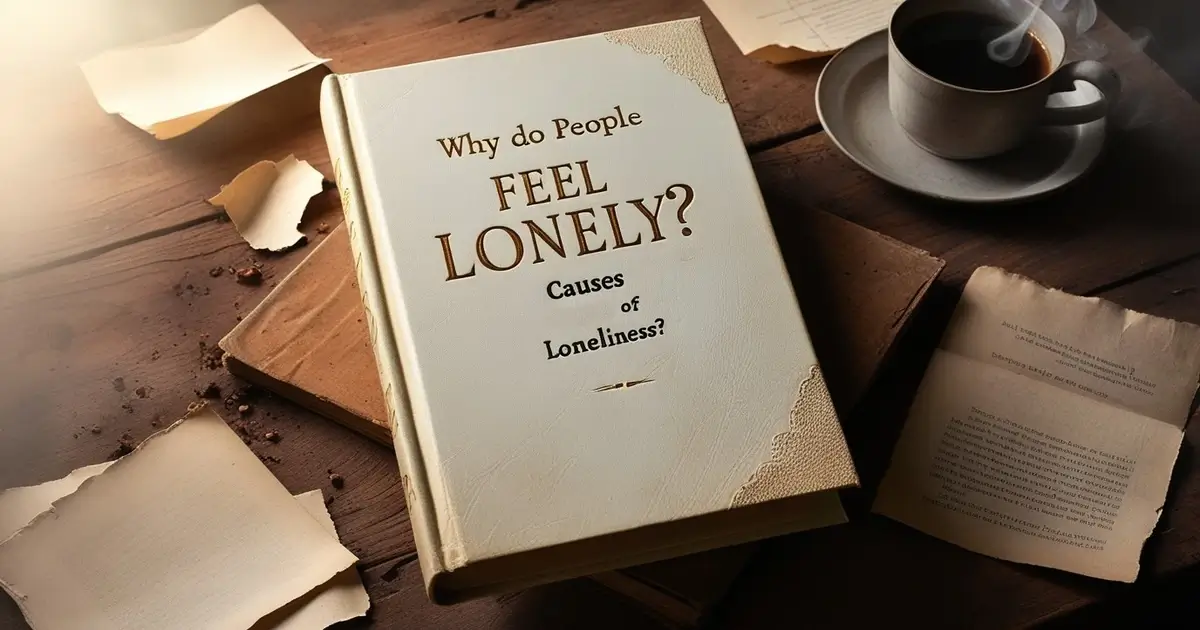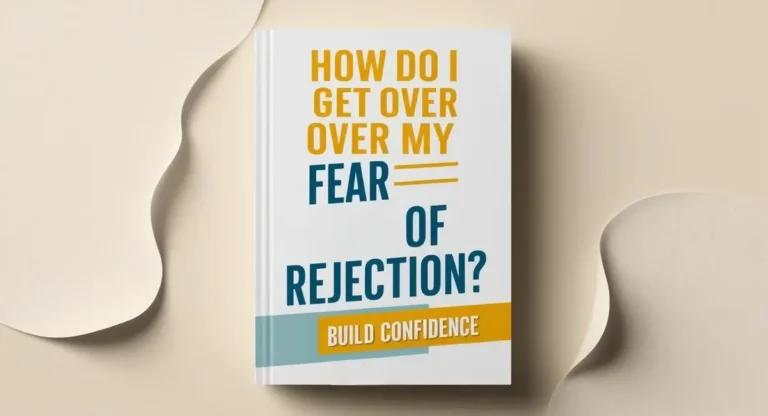Why Do People Feel Lonely? Causes of Loneliness and Solution
Loneliness is a feeling most of us have experienced at some point in life. It is not about being physically alone, but about feeling disconnected. Understanding Causes of Loneliness can help us overcome this emotion and find ways to reconnect with ourselves and others.
The Root Causes of Loneliness
Loneliness often comes from a lack of meaningful connections. It can also stem from how we view ourselves and our place in the world.
Lack of Deep Connections in a Crowded World
“You can be in a room full of people and still feel lonely.” This happens when you don’t feel truly connected to anyone. Sometimes, you just want someone to listen, give a hug, or share a laugh with. Without these moments, you may feel alienated and unseen.
~Loneliness isn’t about physical isolation; it’s about emotional detachment. When your true self feels unseen or unvalidated, the sense of alienation grows.”
The absence of meaningful relationships creates a vacuum where loneliness thrives. In our fast-paced world, making deep connections often takes a backseat to surface-level interactions. We’ve all experienced moments where a simple hug, nod of approval, or heartfelt conversation could’ve made all the difference.
“Sometimes, the connections we crave aren’t grand gestures but small affirmations that remind us we belong.”
The causes of loneliness include our busy lives and superficial relationships. Making time for meaningful conversations is important. Deep relationships, not just acquaintances, make a difference.

Loneliness as a Reflection of Self
“When you depend on others to feel valued, solitude can feel unbearable.” People who base their worth on others’ opinions are more likely to feel lonely when they are alone. Even introverts, though comfortable with less interaction, need some form of validation to feel connected.
“The more aware you are of the roles you play, the lonelier you can feel.”
This awareness makes you see the gap between your social self and your private self.
Modern Life and Loneliness
Technology has made communication faster but less meaningful. “Social media connects us but doesn’t always fulfill our need for deep connections.”
In the past, small, close-knit communities were common. Today, large cities and busy schedules often leave little time for real conversations. Social media gives the illusion of closeness but often fails to fulfill the deeper need for genuine human interaction. Modern lifestyles, characterized by busy schedules and digital communication, leave little room for nurturing deep, real-world relationships.
“Our ancestors lived in tightly knit communities where everyone knew everyone. Today, the vastness of our networks can make us feel like a face in the crowd.”
Table: Then vs. Now – Connections Over Time
| Past (Small Communities) | Present (Modern Life) |
| Small groups, deep relationships | Larger networks, shallow bonds |
| Frequent face-to-face talks | Digital conversations |
| Sense of belonging | Feelings of isolation |
The Emotional Impact of Loneliness
The emotional impact of loneliness goes beyond sadness. It affects mental health and can change how you see the world.
Mental Struggles Linked to Loneliness
“Loneliness can feel like a heavy weight on your heart.” When you feel disconnected, you may also feel anxious, depressed, or unsure of your worth. Over time, this can affect how you think and act.
For example, a lonely person might feel unmotivated or withdrawn. This emotional state often creates a cycle that is hard to break.
“Loneliness isn’t just an emotion; it’s a state of mind that affects your mental and emotional health.”
People who experience prolonged loneliness often struggle with anxiety, depression, and self-doubt. The gnawing sense of isolation can amplify negative thoughts, making it harder to break free from the cycle.
“Loneliness changes you. It doesn’t just make you sad; it creates a void that alters your perception of the world and your place in it.”
The Role of Unspoken Words
“You might have so much to say but can’t find the words to express it.” The fear of being judged or misunderstood often makes people stay silent. This silence deepens the feeling of being alone.
Sharing even small things, like your day’s events or your feelings, can create a sense of connection. “Expressing yourself isn’t just for others; it’s also a way to feel lighter and more understood.”
The Difference Between Being Alone and Feeling Lonely
Being alone and feeling lonely are not the same. Understanding this difference helps us embrace solitude and overcome feelings of disconnection.
Solitude as a Form of Self-Love
“Being alone can be peaceful if you’re in harmony with yourself.” Solitude allows you to spend time with the person you know best—yourself.
“When you are comfortable with who you are, solitude feels less like a burden and more like a retreat.” Many people find that spending time alone helps them recharge and reflect.
Recognizing the Signs of True Loneliness
True loneliness comes from feeling disconnected from both others and yourself. “Loneliness feels like a void, even when you’re surrounded by people.”
Recognizing this disconnection is the first step to overcoming it. Ask yourself if you’re running away from unresolved feelings, like guilt or sadness. Facing these emotions can help you find peace.
“You can’t run from yourself forever. At some point, you have to face what’s keeping you from feeling whole, even when surrounded by others.”
How to Overcome Loneliness and Isolation
If you want to feel connected again, it’s important to take small steps. Building meaningful relationships and reconnecting with yourself can make a big difference.
Building Meaningful Connections
“Strong relationships don’t happen overnight.” Start by sharing a thought or a feeling with someone you trust. Over time, these small interactions build deeper bonds.
To create meaningful relationships:
- Spend quality time with loved ones.
- Show vulnerability by sharing your true feelings.
- Listen to others without judgment.
Finding Purpose in Helping Others
“Helping others can fill your own heart.” Volunteering, joining a community group, or even adopting a pet can give you a sense of purpose and belonging.
For example, therapy pets can be a great source of comfort. “My cats are my reason to get up in the morning. They remind me that love comes in many forms.”
Reconnecting with Yourself
“You can’t connect with others until you reconnect with yourself.” Spend time understanding your feelings. Journaling, mindfulness, or simply sitting quietly can help you find clarity.
Steps to reconnect with yourself:
- Write down your thoughts and feelings.
- Spend a few minutes in silence each day.
- Appreciate small moments, like watching the sunrise or listening to music.
These habits help you feel more grounded and at peace.
Philosophical Note on Loneliness
Loneliness has been part of the human experience for centuries. Accepting it can be the first step to growth and self-discovery.
Accepting Loneliness as Part of the Human Experience
“Loneliness is a reminder that we are all unique individuals.” Instead of fighting loneliness, try to understand it. It can teach you about yourself and the relationships you value most.
“Every quiet moment is an opportunity to grow stronger and wiser.” By accepting loneliness, you turn it into a teacher rather than an enemy.
Finding Peace Through Spirituality
“Spirituality can fill the spaces that loneliness creates.” Faith, meditation, or simply connecting with nature can give you a sense of belonging.
“God’s love is constant and unconditional. When you remember this, loneliness becomes less overwhelming.” Many people find comfort in knowing they are never truly alone.
Conclusion: Turning Loneliness into a Journey of Self-Discovery
Loneliness can feel heavy, but it also offers a chance to grow. By understanding why people feel lonely, you can take steps to build deep relationships, embrace solitude, and reconnect with your true self.
“Loneliness is not the end of the story. It’s a chapter that helps you learn, connect, and become a better version of yourself.”
FAQs
Q1: What are some common causes of loneliness in modern life?
A: The causes of loneliness include the lack of deep connections, reliance on social media for communication, and busy lifestyles that leave little time for meaningful relationships. These factors create a sense of isolation despite being surrounded by people.
Q2: How can I start overcoming loneliness and isolation?
A: Begin by connecting with others in small ways, like sharing your thoughts or joining community activities. Volunteering and adopting a routine can also help. Gradually building meaningful relationships is key to overcoming loneliness and isolation.
Q3: How does loneliness affect mental health?
A: The emotional impact of loneliness includes feelings of sadness, anxiety, and depression. Prolonged loneliness can alter how you perceive the world and yourself, making it harder to form connections or maintain emotional stability.
Q4: What is the difference between being alone and lonely?
A: The difference between being alone and lonely is that being alone can feel peaceful when you’re comfortable with yourself, while loneliness stems from a lack of connection with others or unresolved inner conflicts.
Q5: Can spirituality help in overcoming loneliness?
A: Yes, spirituality offers comfort by providing a sense of belonging and purpose. Whether through meditation, faith, or connecting with nature, it can help you find peace and reduce feelings of isolation.

I’m Mustansar Khan – the person behind this little online haven. I invite you into the ebbs and flows of my life, sharing honest reflections on love, loss, friendship, and everything in between. Join me as I unpack the joys, struggles, and life lessons that make us gloriously, beautifully human.






